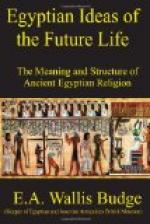What form the details of the history of Osiris took in the early dynasties it is impossible to say, and we know not whether Osiris was the god of the resurrection to the predynastic or prehistoric Egyptians, or whether that role was attributed to him after Mena began to rule in Egypt. There is, however, good reason for assuming that in the earliest dynastic times he occupied the position of god and judge of those who had risen from the dead by his help, for already in the IVth dynasty, about B.C. 3800, king Mea-kau-R[=a] (the Mycerinus of the Greeks) is identified with him, and on his coffin not only is he called “Osiris, King of the South and North, Men-kau-R[=a], living for ever,” but the genealogy of Osiris is attributed to him, and he is declared to be “born of heaven, offspring of Nut, flesh and bone of Seb.” It is evident that the priests of Heliopolis “edited” the religious texts copied and multiplied in the College to suit their own views, but in the early times when they began their work, the worship of Osiris was so widespread, and the belief in him as the god of the resurrection so deeply ingrained in the hearts of the Egyptians, that even in the Heliopolitan system of theology Osiris and his cycle, or company of gods, were made to hold a very prominent position. He represented to men the idea of a man who was both god and man, and he typified to the Egyptians in all ages the being who by reason of his sufferings and death as a man could sympathize with them in their own sickness and death. The idea of his human personality also satisfied their cravings and yearnings for intercourse with a being who, though he was partly divine, yet had much in common with themselves. Originally they looked upon Osiris as a man who lived on the earth as they lived, who ate and drank, who suffered a cruel death, who by the help of certain gods triumphed over death, and attained unto everlasting life. But what Osiris did they could do, and what the gods did for Osiris they must also do for them, and as the gods brought about his resurrection so they must bring about theirs, and as they made him the ruler of the underworld so they must make them to enter his kingdom and to live there as long as the god himself lived. Osiris, in some of his aspects, was identified with the Nile, and with R[=a], and with several other “gods” known to the Egyptians, but it was in his aspect as god of the resurrection and of eternal life that he appealed to men in the valley of the Nile; and for thousands of years men and women died believing that, inasmuch as all that was done for Osiris would be done for them symbolically, they like him would rise again, and inherit life everlasting. However far back we trace religious ideas in Egypt, we never approach a time when it can be said that there did not exist a belief in the Resurrection, for everywhere it is assumed that Osiris rose from the dead; sceptics must have existed, and they probably asked their priests what the Corinthians asked Saint




